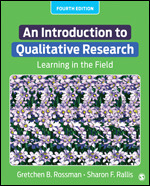An Introduction to Qualitative Research
Learning in the Field
- Gretchen B. Rossman - University of Massachusetts Amherst, USA
- Sharon F. Rallis - 2014 - 2018
Educational Research Methods | Qualitative Research (General) | Sociological Research Methods
Available with Perusall—an eBook that makes it easier to prepare for class
Perusall is an award-winning eBook platform featuring social annotation tools that allow students and instructors to collaboratively mark up and discuss their SAGE textbook. Backed by research and supported by technological innovations developed at Harvard University, this process of learning through collaborative annotation keeps your students engaged and makes teaching easier and more effective. Learn more.
Supplements
Password-protected Instructor Resources include the following:
- Editable, chapter-specific Microsoft® PowerPoint® slides offer you complete flexibility in easily creating a multimedia presentation for your course.
- Sample course syllabi for semester and quarter courses provide suggested models for use when creating the syllabi for your courses.
- Carefully selected, web resources direct you to useful and current content, to extend and reinforce learning or allow for further research on important chapter topics.
- EXCLUSIVE! Access to certain full-text SAGE journal articles that have been carefully selected for each chapter. Each article supports and expands on the concepts presented in the chapter.
The open-access Student Study Site includes the following:
- Carefully selected, web resources direct you to useful and current content, to extend and reinforce learning or allow for further research on important chapter topics.
- EXCLUSIVE! Access to certain full-text SAGE journal articles that have been carefully selected for each chapter. Each article supports and expands on the concepts presented in the chapter.
“This book has all the resources you need to complete your own research and become a more skilled lifelong learner.”
Rossman and Rallis build on their experience as researchers, teachers, and authors to update and improve what I think is simply the best available text for an introductory course on qualitative research methods.

